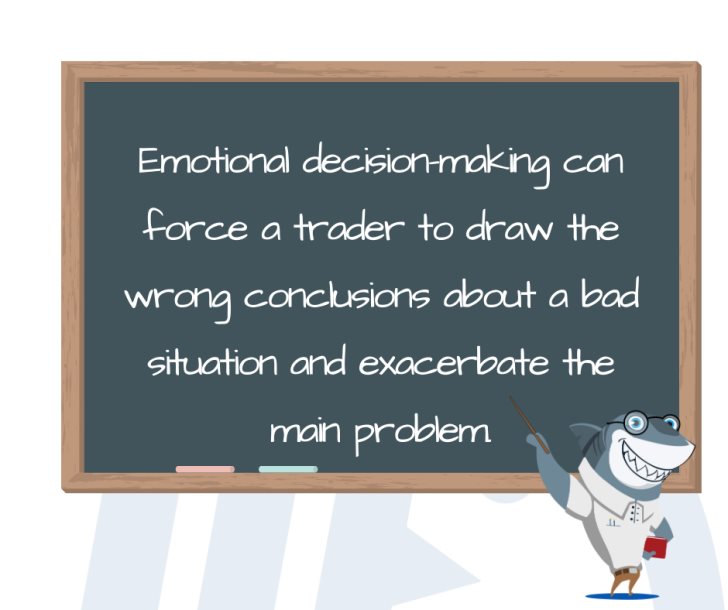
The success rate of one’s trading positions should not be solely weighted against the generated profits or incurred losses per trade, even though this is one way to measure efficiency. Even losing positions can be beneficial to a trader wanting to draw conclusions about his performance from past experience to become better and more precise in the long run. At the same time, profitable trades should be examined with just as much scrutiny as losing ones because they too can have a detrimental impact on one's portfolio. Profitable trades are an opiate that can make even seasoned traders overconfident and reckless over time.
One of the most substantial threats to a trader's psyche is when he allows himself to become overwhelmed by several losses stacked in a row. Emotional traders tend to become stifled with fear that they will not be able to stop making more and more of the same mistakes, which is how fear can cloud one's judgement. This emotional trap becomes even more damaging to traders who discover that their positions became losers after their stop-losses were triggered, only for the underlying price to then go in their anticipated direction.
At such times, traders may feel inclined to start using deeper stop-loss levels, thinking that doing so could protect their underlying positions against adverse fluctuations. This is a perfect example of how emotional decision-making can force a trader to draw the wrong conclusions about a bad situation and exacerbate the main problem. The trader is not focused on discovering the core reason for his misfires, but instead, he feels obligated to find a quick solution to his current predicament. His fear of incurring future losses at the time is stronger than his desire to becoming consistently successful, which is why he might be prompted to make poor decisions that could have detrimental consequences in the future.

Placing deeper stop-losses may appear as a sound decision at first glance; however, the trader is going to continue incurring losses (more substantial ones at that) if he does not improve the other inadequacies in his strategy. Thus, without a proper trading attitude, the trader is likely to arrive at false assumptions about his strategies whenever he feels especially pressured and stressed out.
Traders whose judgement is emotionally impaired by their fear of losing are likely to look for an assuring explanation to their current predicament (an emotional pain relief). They react unconsciously to the added pressure from losing trades in order to elevate their pain by assuring themselves that, ultimately, it was not their fault for losing. More often than not, they start searching for unrelated causes to their underperformance - something beyond their control, to explain away their mounting losses.
The biggest mistake that such traders can make is to attribute their losses to the shortcomings of using stop-loss orders. Even though an inadequate trading strategy may indeed involve poor placement of stop-loss levels (at the wrong places), the fixing of such an issue requires marginal adjustments to the strategy's rules for execution. To completely recalibrate the strategy in such a situation would be considered a mistake because this will mean starting from scratch.
What some traders wrongfully do in similar situations is avoid using narrow SLs altogether. As a result, they start to push the stop-loss levels further away from the entry level, thereby increasing their net exposure. Such behaviour is reckless. Constantly tweaking the parameters of the trade while it develops means that the trader will be more likely to lose track of his edge. That is not to say that he shouldn't intervene whenever he sees clear indications that the underlying sentiment has changed; however, regular changes to existing trades would disorient the trader because he would not be able to see what he was doing wrong in the first place.
The reasoning behind this reckless behaviour has to do with the "feeling" of the market that many worried traders profess to have. It is nothing more than empty hopes that the market might still turn back in their favourable direction, and the only thing they have to do is give the underlying position more room to develop. While this might prove fruitful in some cases, overall, it is not advantageous to overlook the goal of achieving consistency in trading in exchange for such blind hopes.




















